The business of buying a share of a football player, known as Third Party Ownership, or TPO, centred on the purchase of a player’s economic rights. These could be made by individuals, companies or funds, who were then subsequently entitled to a proportionate part of the player’s future transfer fee. The system was eventually banned by world football governing body Fifa in May 2015.
TPO deals were the speciality of Doyen Sports Investment, one of the biggest investment funds in European football.
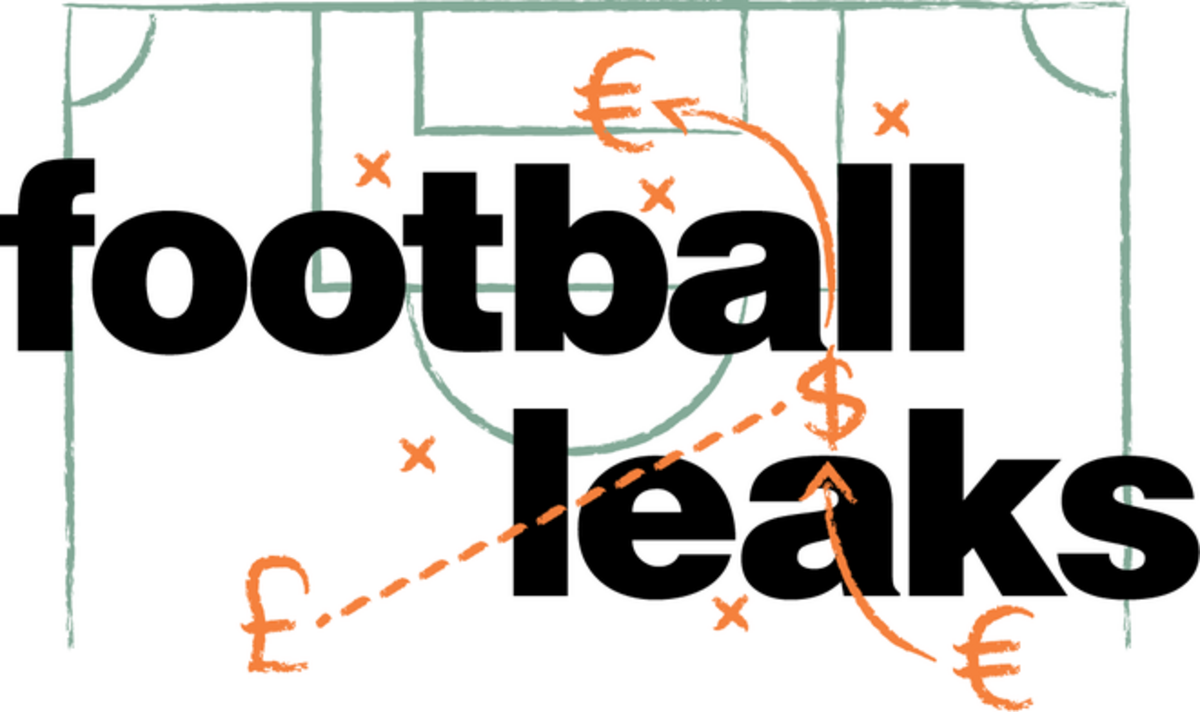
Enlargement : Illustration 1

On August 6th 2013, Nelio Lucas, co-director of Doyen Sports, landed in Miami. He was due to watch a football match the following day between Real Madrid and Chelsea, followed by another, between A.C. Milan and LA Galaxy. There was no particular interest in these off-season friendlies, except for the millions of dollars paid out by the tournament’s sponsor, the beer producer Guiness, to draw top clubs and their stars and managers to the damp, hot Florida summer.
Lucas had not made the trip to watch the teams play, but rather to earn money on the sidelines. Doyen Sports, which had been created barely two years earlier, had that June sealed its first major deal with the transfer of Colombian striker Radamel Falcao from Atlético Madrid to Monaco. The cost of the transfer was 43 million euros, and Doyen Sport owned 33% of Falcao’s economic rights. In Miami, Lucas was eyeing a new moneyspinner in the form of French midfielder Geoffrey Kondogbia.
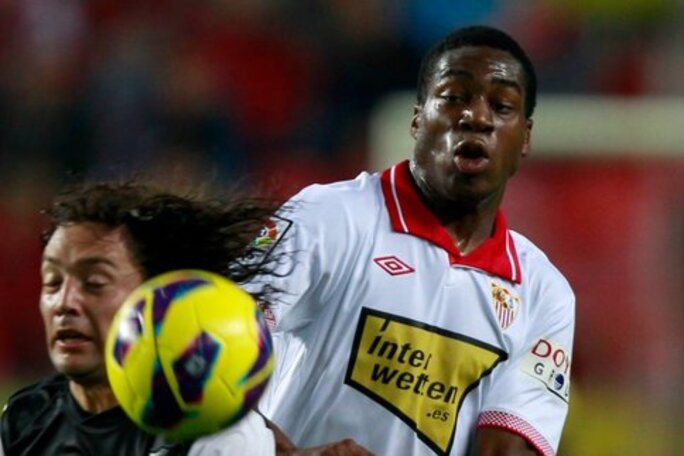
The year before, Doyen Sports had provided 3 million euros to Spanish club Sevilla for the purchase of Kondogbia from French side Lens. Half of the sum was handed over as a loan, while the other half was in exchange for a 50% stake in the player. After one season in Spain, and after winning the under-20-year-olds World Cup alongside team mate Paul Pogba, Kondogbia’s value had soared. It was the moment to strike rich on the investment with a new transfer. The problem was that Sevilla had no wish to sell the Frenchman, and Fifa rules strictly prohibited investment funds from influencing transfer deals.
But that was not enough to stop Doyen Sports. The player’s contract with Sevilla included a 20-million-euro release clause, and the only way to overcome Sevilla’s refusal to sell Kondogbia was to find a club willing to pay the 20 million euros.
Lucas’s trip to Miami, according to documents accessed by the EIC, was primarily to convince Real Madrid president Florentino Perez to agree just such a deal. Now aged 69, Perez is one of the most powerful individuals in Spain. Beyond the prestige bestowed on him as head of the richest club in world football, Perez is also the chairman and CEO of Spanish construction group ACS, the second-largest civil engineering company in the world. His personal wealth is estimated by Forbes magazine at 1.65 billion euros.
To help strike a deal with Perez, Lucas planned to organize a party. The family of Kazakh-Turkish oligarchs who own the Doyen Group possesses a 650-square-metre residence on Fisher Island, a site reserved for the super-rich, lying a short distance from Miami Beach. Nelio Lucas was present at the sprawling property when, at 5.08 p.m. on August 6th 2013, he sent a message from his mobile phone via WhatsApp to Arif Arif, the 27-year-old son of one the four Kazakh brothers who own the Doyen Group, and who runs their Doyen Sports subsidiary alongside Lucas. “I’m in Miami,” wrote Lucas. “Yesterday was amazing. I took few presidents out and even Florentino came with us. Very funny. He removed his tie and danced.” He added that the partying went on at the Mokai club.
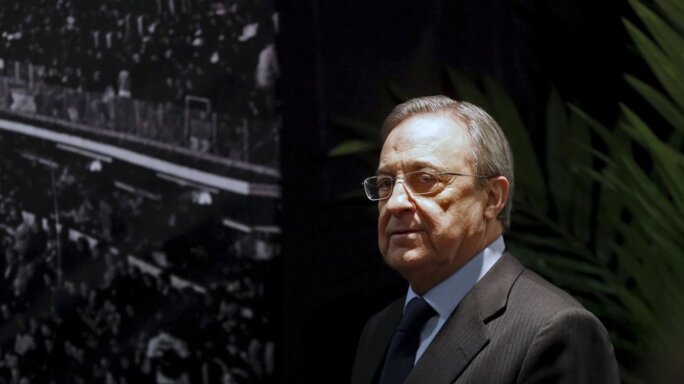
Enlargement : Illustration 3

Lucas wrote of upping the tempo that evening in the Arif family’s Fisher Island residence. “Bro… very important,” he wrote to Arif. “I want to bring some girls to be with us, Florentino, Galliani [editor’s note, Adriano Galliani, vice-president of A.C. Milan) and some directors. It's ok?” Lucas also asked Arif if he can trust a women whose first name is Violet for the procurement of female company. “Never met her bro,” answers Arif Arif. “Do what you have to.”
Arif Arif, 27, set out two conditions, which were “remove the pictures” and “lock the room” of his father, Tevfik, who he nick-named “Skip”. Their exchange of messages continued:
Arif: “Use my room. A Lot of girls have been fucked in that room. The spirit is there! […]
Lucas: “It's where I am !!! I'm staying there”
Arif: “There you go. The spirit of sex attracted you”
Lucas: “I will give Skip room to Florentino then!!
Arif: “For € 20 millions :) For kondogbia”
Nelio: “Thats why we need to look after him”
The next day Lucas texted Arif again. “Took Real Madrid directors and Florentino to the house last night,” he wrote. “Probably also today.” Lucas added that after the party at the Arif residence some moved on to a club. “Only me to take Florentino to disco club,” wrote Lucas, who sent Arif photos of the evening. “You legends !!! » replied Arif.

Contacted by Der Spiegel magazine on behalf of the EIC, Nelio Lucas refused to answer our questions. Instead, the EIC was contacted by Harbottle & Lewis, the London law firm that represents the interests of Doyen Sports, which said its clients took issue with all of the matters raised by the EIC. The legal practice warned that its clients would consider taking legal action if we were to publish the information in question. Harbottle & Lewis said this was obtained through an illegal cyber attack followed by a blackmail attempt which was being investigated in Spain and Portugal.
Also contacted by the EIC, both Real Madrid president Florentino Perez and A.C. Milan vice-president Adriano Galliani strenuously denied ever being present at the Arif residence in Miami. Galliani added that he did not know the Arif family.
Florentino Perez, expressing himself in Spanish, told us of his “indignation” regarding the contents of our questions which, he said, “I consider gravely attack my honour and my reputation”. Perez said he remembered having gone to a Miami night club with his wife, together with his friend Adriano Galliani and Galliani’s wife, joined by members of the management of Real Madrid and “other individuals linked to the world of football”. Perez insisted that he never set foot in the Arif property, and did not attend “any type of party in any other place in Miami”. Perez added that “to my knowledge, during this trip by Real Madrid, no-one tried to convince me to hire the player Kondogbia”.
Did Nelio Lucas make up the events he described in his phone text messages in order to impress Arif Arif? Two days after the last text message cited above here, Lucas, as he readied to leave Miami, wrote another to Arif Arif to inform him that his hopes of reaching a deal with Real Madrid to pay the 20-million-euro release clause for Kondogbia had fallen through. “Real pays only 15,” Lucas wrote.
Meanwhile, Lucas valued his relationship with Real Madrid president Perez, a powerful figure in the football business. “My relation there is more solid than titanium,” wrote Lucas, several months later, about his dealings with Perez.
Perez, meanwhile, was quoted on the Doyen Sports website (see below) extolling the “professionalism” of the company, and recognising "it was and is important for Spanish football”. While he said Real Madrid received no TPO investment from Doyen Sports, “our experience with them in other subjects is immaculate” Perez is quoted as saying.
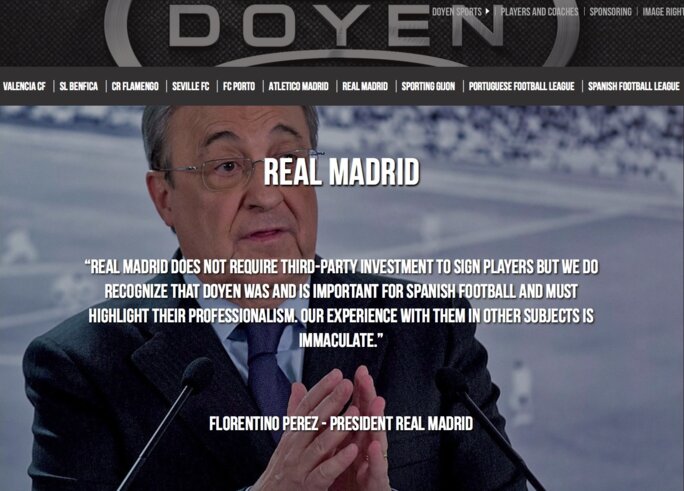
Enlargement : Illustration 5

Questioned by the EIC about his praise for Doyen Sports, Perez replied: “I cannot answer you about why on their website I am attributed with [having said] such a phrase, which I do not remember saying.” Perez added that Real Madrid “has never carried out any operation whatever through the intermediary of the agent Nelio Lucas or the intermediary of Doyen Sports”.
Lucas continued to seek a transfer deal for Geoffrey Kondogbia. “I’m killing my balls to find someone to pay the clause of Kondogbia”, he wrote to Arif Arif on August 9th 2013, shortly before he returned to Doyen Sports’ offices in London. At a press conference three days later, the president of Sevilla, José Maria Del Nido, apparently irritated over the media reports of rumours that the French midfielder was to be sold by his club, said he regarded the unsettling speculation “as an aggression” and insisted: “Geoffrey Kondogbia is not on the market […] He who wants him must […] pay his release clause.” Del Nido added that he had made a deal with Doyen Sports, which owned 50% of the player, “to reject any offer made this year”.
It was difficult to find a club ready to pay up the 20 million euros for a 19-year-old who, however talented, was just 14 months earlier playing in France’s second division, Ligue 2, with Lens. Arif Arif envisaged a deal with Manchester United, and wrote to Lucas in a phone text message, “Surely you can force Moyes to pay?”, a reference to the club’s then manager David Moyes. “I will try”, replied Lucas. But two days later he received a definitive rejection from Manchester United. “You know how united are, they only pay premium for fat Brazilian or Portuguese retards,” Arif wrote in a text message to a friend.
In the end it was French club Monaco who agreed to pay the 20 million euros for Kondogbia. “Great deal for us,” texted Lucas to Arif on August 27th 2013. Arif replied: “Congrats bro!!!!!!!” The transfer deal, because of the company’s 50% stake in Kondogbia, gave Doyen Sport a net profit of 7.8 million euros, which represented a 524% return on its initial investment in just one year.
It is likely that the young French midfielder would have hoped to join a major European club instead. “I hope we didn’t ruin his career,” wrote Arif Arif of the deal with Monaco. “My heart is broken. I have more sympathy for this kid than for Falcao,” he added, referring to Colombian striker Radamel Falcao who was also transferred to Monaco (from Atlético Madrid) two months earlier. “Look to the bank account in few days and you will feel different,” answered Lucas.
“I wanted the kid to move to a solid team and deliver one of the highest of levels so we can get the recognition we deserve,” wrote Arif in another text message to a friend. “But this ended up being a pure financial play.”
But the “financial play” was no less questionable. Lucas wrote in internal emails that a secret commission of 1.3 million euros was paid to smooth the transfers to Monaco of Kondogbia and Falcao, (see document below). It was in June 2014, one year after the transfers, that Lucas created an offshore shell company called Denos Limited to be used for the secret payments. It was registered in Ras al-Khaimah, one of the seven emirates that make up the United Arab Emirates (UAE) and the most opaque of any of the Middle East tax havens.
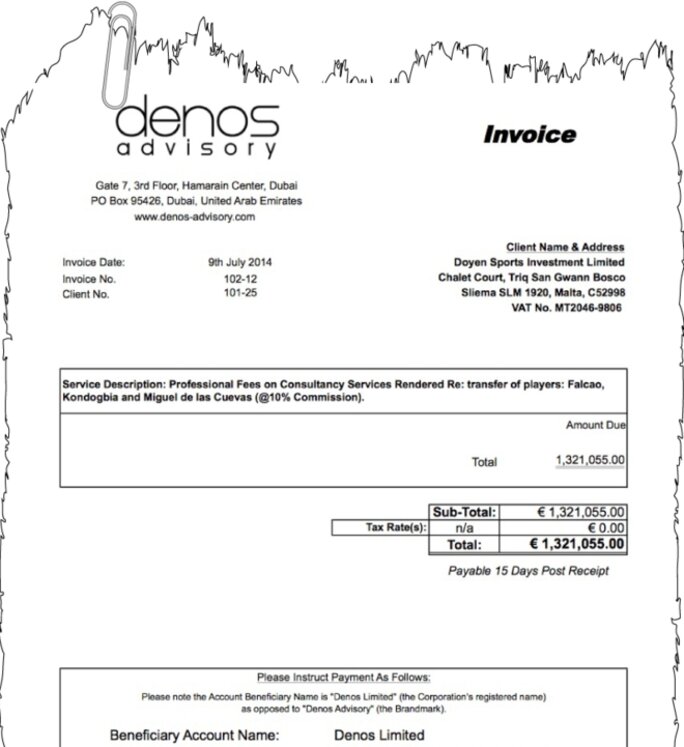
Enlargement : Illustration 6

Doyen Sports was to send to Denos 10% of the profits made on transfers. Lucas would explain in one message that this arrangement was for “people we need to compensate” and who did not provide “paperwork”. On July 17th 2014, Doyen Sports made an initial transfer into Denos of 1.3 million euros, of which 785, 865 euros concerned the transfer of Kondogbia, and 533,190 euros concerned that of Falcao. The payment was camouflaged with a contract and an invoice indicating that Denos had engaged in an advisory role for the transfers. The Football Leaks documents do not reveal to who the money was ultimately destined.
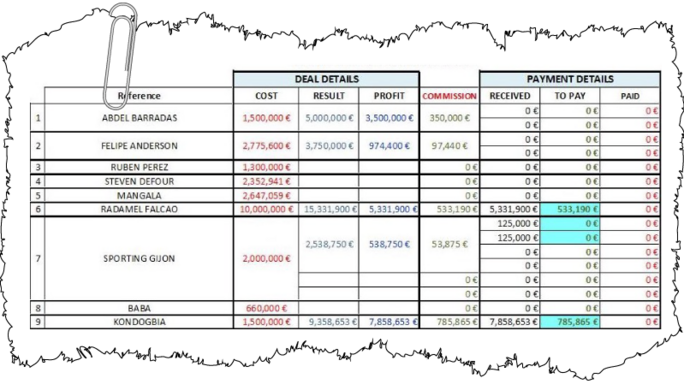
Enlargement : Illustration 7

Six months later, Fifa launched an investigation into Kondogbia’s transfer to Monaco. On January 6th 2015, Kimberly Morris, head of Fifa’s TMS Integrity and Compliance department wrote to Spanish club Sevilla asking for all the documents relative to the French midfielder’s transfer to Monaco, the payment details, and in particular the payments linked to Doyen Sports. “Information available to us indicates that your club and/or a third party related to your club would have received payments in connection with this transfer,” she wrote, reminding the club that any influence by exterior parties on the independence of transfer policies is an infringement of Fifa’s rules. Fifa also suspected that a secret payment of 500,000 euros was made during Kondogbia’s earlier transfer to Sevilla from French club Lens in 2012.
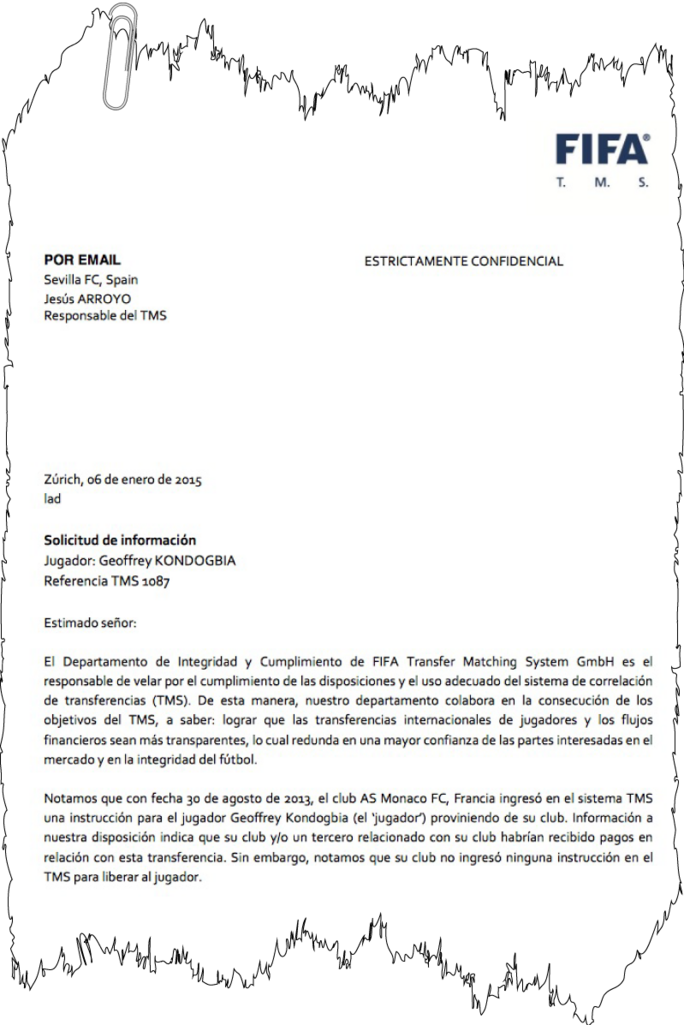
Enlargement : Illustration 8

That investigation followed a complaint lodged with the head of Fifa’s legal affairs department in December 2014 by Italian football agent Gianluca Fiorini. The agent accused Doyen Sports of committing “grave abuse” during Kondogbia’s move to Monaco because, he argued, it held a stake in the player and was also acting as the agent for then Monaco manager Claudio Ranieri (who is now manager of English club Leicester City).
Fiorini said he had discovered this during a conversation four months before the transfer with Spanish agent Juan Manuel Lopez who, according to the Italian, told him he was Kondogbia’s agent. Fiorini said Lopez recounted that he had “invested” in Doyen Sports, just like his Italian colleague Giuseppe Bozzo, who was Ranieri’s agent. The two agents are well connected to Doyen Sports: Lopez is one of Nelio Lucas’s three principal professional collaborators, and Bozzo is the exclusive representative for Doyen Sports in Italy
All those involved in Kondogbia’s transfer to Monaco and who accepted to answer questions from the EIC strenuously denied the accusations. Kondogbia’s agent Jonathan Maarek insisted that he was the one and only representative of the player, and that Juan Manuel Lopez had never been the player’s agent. Maarek added that he had never been in contact with Ranieri during the negotiations with Monaco. Meanwhile, Giuseppe Bozzo said he had worked with Ranieri only in 2011, and was therefore not the manager’s agent during Kondogbia’s transfer to Monaco in which, he said, he had “absolutely not participated”.
Monaco, the club, said it had “no information at all concerning supposed agreements by Mr Bozzo”. Claudio Ranieri did not reply to the EIC’s attempts to contact him.
According to information obtained by the EIC, the Fifa investigation ended at the beginning of this year, when Sevilla was given an official warning over its conduct and was ordered to pay a fine of 55,000 Swiss francs. But this concerned a comparatively minor matter. The contract the club had agreed with Doyen allowed for the automatic sale of Kondogbia if an offer was made for him that was equal or superior to 6 million euros. That clause was never activated, but it was ruled to be illegal by Fifa because it gave Doyen Sports significant influence over the club. Sevilla has appealed against the Fifa ruling.
It appears that Fifa did not lead a thorough investigation because from what the EIC has been able to establish none of those accused in Gianluca Fiorini’s formal complaint have been questioned by the football governing body. “We are absolutely not aware that a complaint would have been lodged, and we have, moreover, never been asked about the matter by Fifa,” Monaco told the EIC. It also appears that Fifa was unable to substantiate the suspected secret payments it referred to at the beginning of the investigation.
The documents from Football Leaks have identified a secret payment by Doyen Sports in connection with Kondogbia’s transfer to Monaco amounting to 785, 865 euros. However, it remains to be established who ultimately benefitted from the sum after it transited through the UAE.
-------------------------
- This article in English is based on Mediapart's original report in French, which can be found here.


